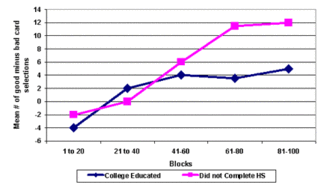Many gambling studies have shown that people with less education might be more susceptible to certain forms of gambling (e.g., playing the lottery) and to developing gambling problems (see Abdel-Ghany & Sharpe, 2001; Welte, Barnes, Wieczorek, Tidwell, & Parker, 2004). Last week, the WAGER reviewed a study by Hertwig, Barron, Weber, and Erev (2004) suggesting that being provided with the exact odds might actually be as much of a liability as not knowing them. This week, in the second of this two part series, the WAGER reviews an article by Evans, Kemish, and Turnbull (2004) which showed that people with more education have a harder time than their less-educated peers in learning from experience on a gambling task.
In the study by Evans et al., the authors recruited 15 female participants enrolled in college and 15 female participants who had dropped out of high school. The college-educated participants scored higher on both intelligence tests and executive function tests than the participants who did not complete high school. Both groups participated in the Iowa Gambling Task (Bechara, Damasio, Damasio, & Anderson, 1994), described in WAGER 8(51), in which they selected cards from four decks – one with high pay-out but frequent moderate loss, one with high pay-out but infrequent high loss, one with lower pay-out and frequent low loss, and one with lower pay-out and infrequent moderate loss. The first two decks resulted in net loss and the last two in net gain.
Figure 2. Mean number of good minus bad card selections for participants who did not complete high school and college participants (adapted from Evans et al., 2004).
Note. A repeated-measure ANOVA demonstrated a statistically significant interaction between block and group, F(4,112) = 4.48, p < .01.
Participants who had not completed high school demonstrated a better learning curve (i.e., continued improvement across the blocks of the experiment) and more advantageous selections than their college counterparts.
This study suggests that college students – people who have been taught to rely on what they have read and learned in class – fail to learn from experience in a gambling task and consequently make risky, disadvantageous decisions. Since the Iowa Gambling Task resembles many casino games, in which the odds are not always crystal clear, this experiment, like Hertwig et al. (2004), shows riskier gambling choices by people relying on descriptive information compared to those who learn from experience.
Evans et al.’s study has its limitations. It involved only a small number of participants, all of whom are female, so it is not generally representative. The enrollment of college students, instead of adults with a college education confounds the effects of education with the known elevation of risk-taking behavior in college students. The experiment also did not control for possible different motivations of the two groups of participants. It might be that the money that could be made was more of an incentive to the participants who did not complete high school than to the college participants.
Despite these concerns, these two experiments taken together (Hertwig et al., 2004; and Evans et al., 2004) provide intriguing findings that: a) conventional education about the odds of gambling might not be the best preventative measure against problem gambling; and b) well-educated gamblers are not immune to the risks of gambling and might be particularly vulnerable to making risky decisions once they have decided to gamble. Keep in mind the often disquieting results obtained when education about drug or alcohol abuse fails to prevent such abuse. This new research on risky decision making suggests that problem gambling prevention efforts should not rest on information alone and ought to include experiential-based learning opportunities about the risks of gambling.
Comments on this article can be addressed to Sarah Nelson.
References
Abdel-Ghany, M., & Sharpe, D. L. (2001). Lottery expenditures in Canada: Regional analysis of probability of purchase, amount of purchase, and incidence. Family &
Consumer Sciences Research Journal, 30(1), 64-78.
Bechara, A., Damasio, A. R., Damasio, H., & Anderson, S. W. (1994). Insensitivity to future consequences following damage to human prefrontal cortex. Cognition, 50, 7-15.
Evans, C. E. Y., Kemish, K., & Turnbull, O. H. (2004). Paradoxical effects of education on the Iowa Gambling Task. Brain and Cognition, 54, 240-244.
Hertwig, R., Barron, G., Weber, E. U., & Erev, I. (2004). Decisions From Experience and the Effect of Rare Events in Risky Choice. Psychological Science, 15(8), 534-539.
Welte, J. W., Barnes, G. M., Wieczorek, W. F., Tidwell, M. C., & Parker, J. C. (2004). Risk factors for pathological gambling. Addictive Behaviors, 29(2), 323-335.





